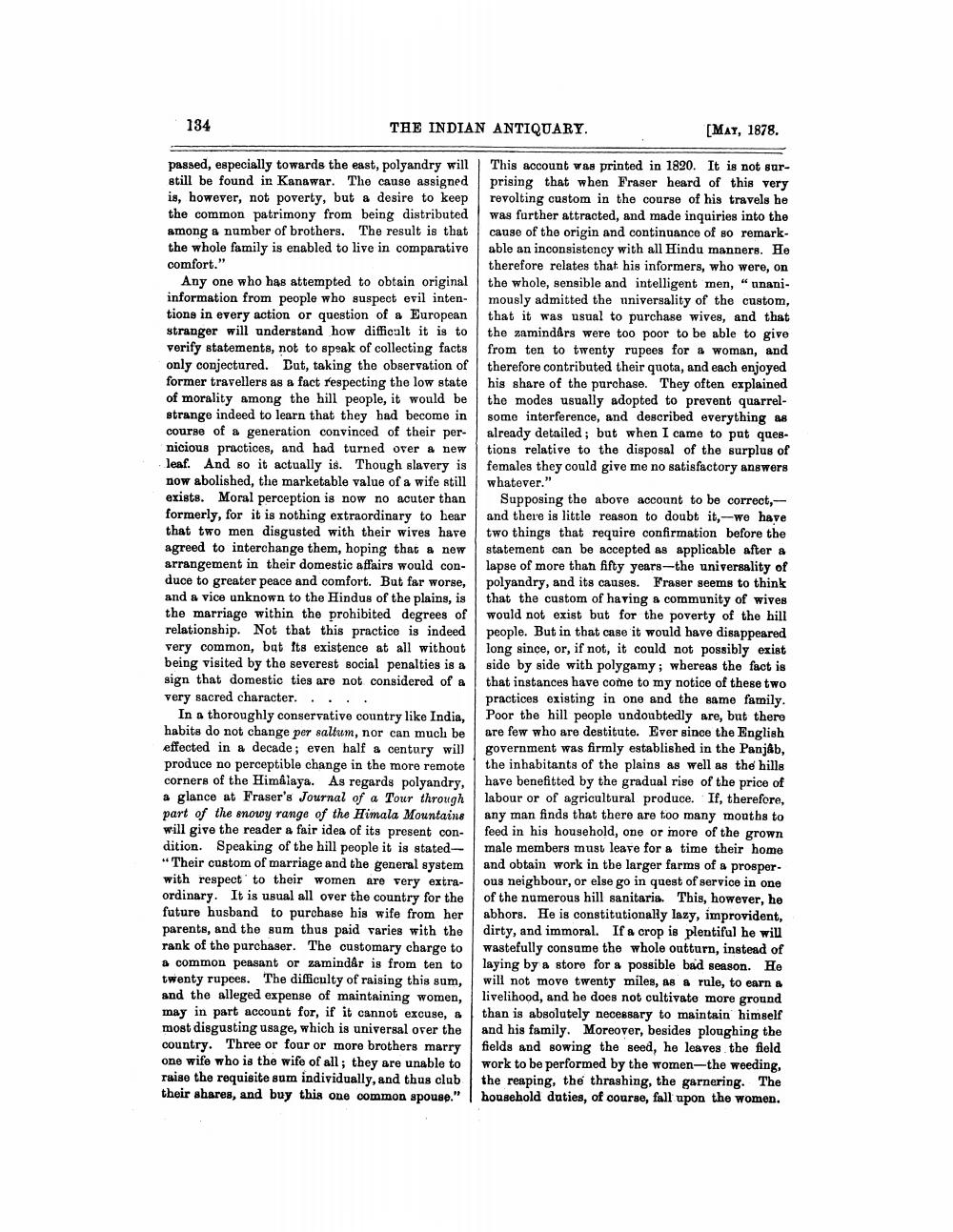________________
134
THE INDIAN ANTIQUARY.
[MAY, 1878.
passed, especially towards the east, polyandry will still be found in Kanawar. The cause assigned is, however, not poverty, but a desire to keep the common patrimony from being distributed among a number of brothers. The result is that the whole family is enabled to live in comparative comfort."
Any one who has attempted to obtain original information from people who suspect evil intentions in every action or question of a European stranger will understand how difficult it is to verify statements, not to spsak of collecting facts only conjectured. Dut, taking the observation of former travellers as a fact respecting the low state of morality among the hill people, it would be strange indeed to learn that they had become in course of a generation convinced of their per- nicious practices, and had turned over a new leaf. And so it actually is. Though slavery is now abolished, the marketable value of a wife still exists. Moral perception is now no acuter than formerly, for it is nothing extraordinary to hear that two men disgusted with their wives have agreed to interchange them, hoping that a new arrangement in their domestic affairs would conduce to greater peace and comfort. But far worse, and a vice unknown to the Hindus of the plaing, is the marriage within the prohibited degrees of relationship. Not that this practice is indeed very common, but its existence at all without being visited by the severest social penalties is a sign that domestic ties are not considered of a very sacred character.....
In a thoroughly conservative country like India, habits do not change per saltum, nor can much be effected in a decade; even half a century will produce no perceptible change in the more remote corners of the Himalaya. As regards polyandry, a glance at Fraser's Journal of a Tour through part of the snowy range of the Himala Mountains will give the reader a fair idea of its present condition. Speaking of the hill people it is stated" Their custom of marriage and the general system with respect to their women are very extraordinary. It is usual all over the country for the future husband to purchase his wife from her parents, and the sum thus paid varies with the rank of the purchaser. The customary charge to a common peasant or zamindêr is from ten to twenty rupees. The difficulty of raising this sum, and the alleged expense of maintaining women, may in part account for, if it cannot excuse, & most disgusting usage, which is universal over the country. Three or four or more brothers marry one wifo who is the wife of all; they are unable to raise the requisite sum individually, and thus club their shares, and buy this one common spouse."
This account was printed in 1820. It is not surprising that when Fraser heard of this very revolting custom in the course of his travels he was further attracted, and made inquiries into the cause of the origin and continuance of 80 remarkable an inconsistency with all Hindu manners. He therefore relates that his informers, who were, on the whole, sensible and intelligent men, "unani. mously admitted the universality of the custom, that it was usual to purchase wives, and that the zamindårs were too poor to be able to give from ten to twenty rupees for a woman, and therefore contributed their quota, and each enjoyed his share of the purchase. They often explained the modes usually adopted to prevent quarrelsome interference, and described everything as already detailed; but when I came to put questions relative to the disposal of the surplus of females they could give me no satisfactory answers whatever."
Supposing the above account to be correct,and there is little reason to doubt it.-we have two things that require confirmation before the statement can be accepted as applicable after a lapse of more than fifty years--the universality of polyandry, and its causes. Fraser seems to think that the custom of having a community of wives would not exist but for the poverty of the hill people. But in that case it would have disappeared long since, or, if not, it could not possibly exist side by side with polygamy; whereas the fact is that instances have come to my notice of these two practices existing in one and the same family Poor the hill people undoubtedly are, but there are few who are destitute. Ever since the English government was firmly established in the Panjab, the inhabitants of the plains as well as the hills have benefitted by the gradual rise of the price of labour or of agricultural produce. If, therefore, any man finds that there are too many mouths to feed in his household, one or more of the grown male members must leave for a time their home and obtain work in the larger farms of a prosper. ous neighbour, or else go in quest of service in one of the numerous hill sanitaria. This, however, he abhors. He is constitutionally lazy, improvident, dirty, and immoral. If a crop is plentiful he will wastefully consume the whole outturn, instead of laying by a store for a possible bad season. He will not move twenty miles, A8 rule, to earn livelihood, and he does not cultivate more ground than is absolutely necessary to maintain himself and his family. Moreover, besides ploughing the fields and sowing the seed, he leaves the field work to be performed by the women--the woeding, the reaping, the thrashing, the garnering. The household duties, of course, fall upon the women.




